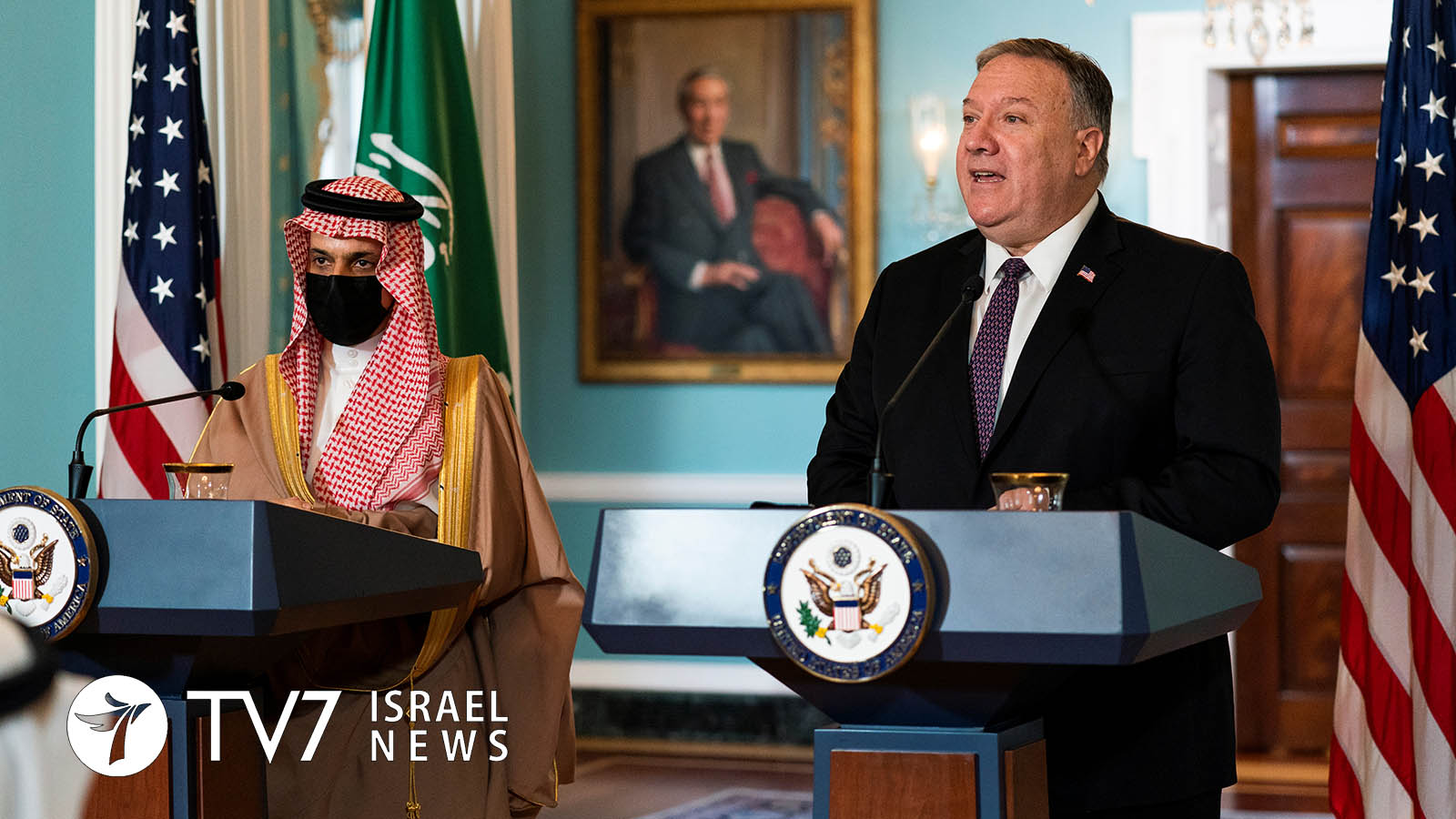U.S. Secretary of State Mike Pompeo announced that he has urged Saudi Arabia to consider normalizing relations with Israel. Pompeo said he raised the issue while hosting Saudi Foreign Minister Faisal bin Farhan Al Saud in Washington, D.C.
Pompeo said that he advocated Riyadh join the Abraham Accords signed in September between Israel, Bahrain and the United Arab Emirates, pointing out how the U.S.-brokered agreement “contribute greatly to our shared goals for regional peace and security.”
The UAE and Bahrain deals with the Jewish State signals a major strategic realignment of Middle Eastern countries against Iran. In an appeal to join forces over these concerns shared by Saudi Arabia, Pompeo underscored that Abraham Accords “reflect a changing dynamic in the region – one in which countries rightly recognize the need for regional cooperation to counter Iranian influence and generate prosperity.”
The top American diplomat then proclaimed the Trump Administration’s “hope Saudi Arabia will consider normalizing its relationships as well,” and said “we want to thank them for the assistance they’ve had in the success of the Abraham Accords so far.”
The United States is trying to persuade more Gulf countries to strike similar accords with Israel. Riyadh has quietly acquiesced to the UAE and Bahrain deals, but stopped short of endorsing them. The Kingdom has also indicated it is not ready to take such action itself
Saudi Arabia, the birthplace of Islam and site of its holiest shrines, drew up a 2002 initiative under which Arab nations would normalize ties with Israel in return for a statehood deal with the Palestinians and full Israeli withdrawal from territory captured in 1967.
Touching on that issue, Pompeo went on to express Washington’s desire for Saudi Arabia to encourage Palestinian leaders to revive peace negotiations with Israel.
Both statesmen praised ongoing relations between their nations and pledged to continue strengthening them. “Under the leadership of King Salman and President Trump, we look forward to expand our ties, enhance our institutional cooperation, and elevate our partnership to new heights,” said the top Saudi diplomat.
Pompeo announced that as “proof” of the “mutual willingness to grow not only our security and economic ties, but our whole partnership,” Washington is “preparing to acquire a 26-acre site for a new U.S. embassy in Riyadh.” He said that the “this project, along with the recent opening of a new consulate in Jeddah and the ongoing construction of a new consulate in Dhahran represents a U.S. investment of over one billion dollars;” in addition to Washington support of a “robust program of arms sales” to the Kingdom.
In related developments, Pompeo announced that the U.S. is pleased that the Iraqi government is doing more to protect the U.S. embassy in Baghdad from Iran-backed Shiite Muslim militias.
“We are happy that the Iraqis are doing more to provide increased security for our team on the ground there,” Pompeo told a State Department news conference.
He declined, however, to provide an update on whether Washington is still considering closure of its embassy. Washington, which is slowly reducing its 5,000 troops in Iraq, threatened last month to shut down the diplomatic compound unless Baghdad authorities reined in Iran-aligned terror groups that have attacked U.S. interests with rockets and roadside bombs.
A spokesman for Kataib Hezbollah, one of the most powerful Iran-backed militia groups in Iraq, said earlier this week that it has suspended rocket attacks on U.S. forces – on condition that Iraq’s government present a timetable for the withdrawal of the American troops.
When asked by a reporter if Washington viewed that announcement as “progress,” Pompeo did not specifically answer but sounded doubtful about Kataib Hezbollah’s ceasefire declaration. “We have a rogue set of militias who have now promised not to violate the Iraqi people’s sovereignty and to take aim at the U.S. diplomats serving there that are designed to help the Iraqi people,” he replied.
The U.S. warning has raises alarm bells in Iraq, where it was interpreted as a possible a step toward air strikes – that could potentially turn the country into a battleground for a proxy war between the U.S. and Iran. Iraqi politicians across the political spectrum reacted by calling on the Kataib Hezbollah to stop provoking the Americans.
Turning to the New START nuclear arms control treaty, Pompeo also said the U.S. would be open to extending it past its expiration in February based on understandings reached in recent talks with Russia.
“We would welcome the opportunity to complete an agreement based on the understandings that were achieved over the last couple of weeks about what the range of possibilities look like for an extension of New START and an outcome that benefits the entire world – increased stability of the most dangerous weapons in the world,” Pompeo said.
He added that the U.S. Special Presidential Envoy for Arms Control Ambassador Marshall S. Billingslea and his team are “working really hard on it,” and expressed hope “that the Russians will find a way to agree to an outcome, that frankly I think is in their best interest and in our best interest.”
Pompeo also expressed the U.S. hope “that the Chinese Communist Party will come to see that this kind of work – this kind of diligent work – to decrease risk, to take instability out of the entire world from these very dangerous weapons, from these nuclear weapons that can proliferate so easily and you can end up with a really bad day…. hope the Chinese Communist Party will come to see this is how mature nations deal with these issues and will come to join us in this conversation as well.”
